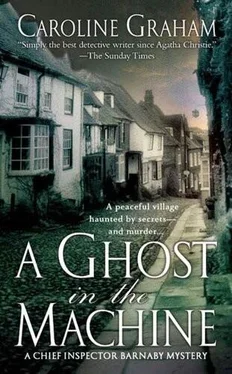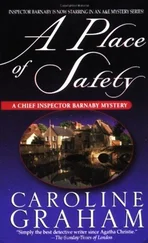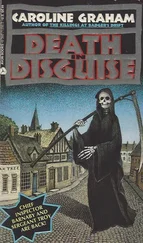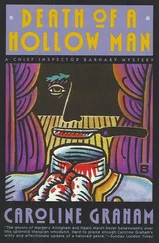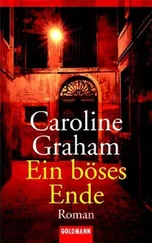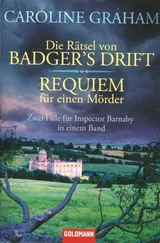Barnaby did not leave it there. He explained the circumstances of her admission; related his conversation with the family solicitor. Latham was made aware that he had been the only beneficiary in Gilda’s will; a place now seconded to the Cat Protection League. That her health was such as to encourage imminent collapse. And that if he had walked away from the marriage the circumstances were such that any court in the land would have granted him recompense.
By the time the chief inspector had finished speaking Latham was practically unrecognisable. It looked, Sergeant Troy remarked afterwards, as if all the blood had left his body. All the blood but not the bile. A few seconds later and, quite without warning, yellow liquid arched into the air and all over the tape recorder.
“Sir?” Troy brought the present back into the room. “D’you think we’ll get witnesses for whatever happened at Northwick Park?”
Barnaby was sure of it. “Photographs of them both are well circulated. And details and pictures of his car. Wherever he took her someone will remember.”
“No wonder he panicked when we locked him up.”
“At the moment he’s a broken man. Lean a bit and he’ll probably snap. Also there’s the matter of this accomplice. We can dangle a possible sentence reduction under his nose if he’s prepared to betray her.”
Sergeant Troy, having fastened his jacket, unfastened it, then fastened it again. He examined his shirt front, rubbed the toecaps of each shoe on the backs of his trousers and began to comb his hair.
Barnaby laughed. “She taking you home to meet her mother?”
“I’ll thank you not to mention mothers,” said Troy. “Or the word Sproat.” He sniffed inside his jacket.
“Don’t do that. It’s like the monkey house at the zoo.”
But Troy was already gone, quickly, without even a good night.
Barnaby returned to his position by the window and his perusal of the sky, darkening at the end of the day. He was still struck by the melancholy beauty of that phrase despite it having become such common currency that a journalist on The World at One recently referred to it as “the ee of the dee.”
Though he tried not to dwell on it, his retirement was more and more on his mind. He was taking the earliest option available without losing out on his pension. Another five years could be served but Joyce had got very upset when he had mooted the idea and Cully had fiercely backed her mother up. He saw their point and would not have had it otherwise. Love meant other people had claims on you.
Though the date was a good six months away he was already being asked around the station what he would do. Barnaby never knew how to reply. He would have liked to say “nothing” but knew this would be considered strange. Everyone had a story about someone they knew who had tried this. Physically in good shape, economically comfortable, psychologically they were dead men. Pushing up daisies within six months was the favoured tag line.
Barnaby did know what he wouldn’t do. He would not become a collector. He would not become enmired in the wasteland of silicon chip technology. Neither would he begin wearing shorts and a reversed baseball cap and start behaving like someone half his age. No marathon running or ball games or, God forbid, golf. No bridge or anything else that involved sitting still for long periods and bickering with grumpy elders. No plastic surgery – his double chin could stay where it was. And, above all, no bowls.
He knew people who did some or all of those things. Only the other day he had run into a former colleague. They had exchanged a few words and Barnaby suggested a quick half in the Magpie to catch up on each other’s news. The man declined. Boasting that he had never been busier he riffed through all the things he still had to do before bedtime, then disappeared like the white rabbit, agitating his wristwatch and bringing it up to his ear.
Barnaby felt vaguely depressed after this encounter. He knew he could never cram his life with things that would normally give him no pleasure just to escape aimlessness and boredom. What an arid, starveling prospect. And all to avoid facing the fact that the hourglass was running out.
Things were handled differently in the East. Apparently the first third of their lives out there was spent learning how to live, the middle section by becoming a householder and raising a family. Finally they retired to a hut in the forest to meditate on the meaning of life, gradually dissolve the ego and learn how to die. Cully told him all about it one evening. He was grumbling about having to take blood pressure pills and she was trying to persuade him that deep relaxation was a safe alternative.
Barnaby had a vivid image of himself sitting cross-legged, clad only in a loincloth under a spreading chestnut tree. He snorted with laughter, liked the sound of it and laughed some more. It did him the world of good.
About to turn from the window, a movement on the station steps caught his eye. Detective Sergeant Troy was leaving the building accompanied by WPC Carter. They walked, their heads close in earnest conversation, towards Troy’s beloved Ford Cosworth. Abby Rose climbed into the passenger seat but seemed unable to fasten her seat belt properly. Troy hesitated then, about to close the door, reached across her lap to help, staying in that position rather longer than was necessary.
Barnaby turned away before he could become at all saddened at what such an incident might foretell. His thoughts leaped forward twenty-four hours. Tomorrow night he and Joyce would be driving to Limehouse for supper chez Bradley. Cully said they must celebrate their very first visit by choosing whatever they liked to eat. Joyce had decided on her favourite starter: chunks of jellied beef consommé and Boursin’s pepper cheese on hot toast. Barnaby fancied steak and kidney pudding with cauliflower and new potatoes. An apricot sorbet, they both agreed, would round things off nicely. Already Barnaby’s stomach rippled gently in anticipation.
Oh, lucky man! Happiness beckoned. He switched off the light and went home.
Just over a month had passed since the man arrested on suspicion of the murder of Dennis Brinkley had been formally charged and remanded in custody to await trial at Aylesbury Assizes. Forbes Abbot’s outrage at the doing to death of one of its own having been suitably assuaged, the village, briefly glamorous and in all the papers, once more subsided into its usual comfortable, unthreatening routine.
Autumn was almost upon them. Bonfires were crackling and huff was being taken about the smoke and the breaking of “not until dusk” by-laws. The Horse and Hounds darts team were setting up match schedules with neighbouring villages. A quiz in aid of multiple sclerosis took place at the village hall and the last cricket match of the season was being played out on the green. Preparations for the Christmas Fayre were already being mooted. The competition at the September meeting of the WI was Your Best Ever Mincemeat Recipe. And rumour had it that Mrs. Lattice of Mon Repos had already secretly weighed out in readiness for the making of her notorious puddings.
Mists and mellow fruitfulness were the order of the day and fruit came no more mellow than the beautiful apples now being carefully graded and packed in the orchard of Appleby House. Over the last couple of weeks fewer and fewer pickers had been needed and now the final handful were being paid off.
David and Helen Morrison of Pippins Direct were helping to load the last boxes into the back of an open lorry to be driven to the market at Seven Dials. Mallory watched, hovering awkwardly. He had got to know the Morrisons slightly over the last few weeks but inevitably, given the convulsive events in his own life and the extreme business of theirs, it had been very slightly. Feeling he should be there to see them off he stuck it out, smiling and waving until the lorry finally pulled away. They would return once the leaves had fallen, David had explained, to start pruning.
Читать дальше
